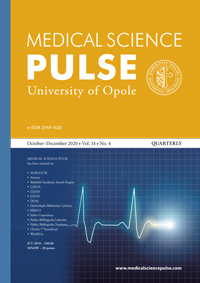Evaluation of balance and fall risk in geriatric ward patients.
Evaluation of balance and fall risk in geriatric ward patients.
Author(s): Antonina Kaczorowska, Sylwia Rusek, Ewelina Lepsy, Aleksandra Katan, Agata MroczekSubject(s): Health and medicine and law
Published by: Uniwersytet Opolski
Keywords: aging; aged; accidental falls; geriatrics
Summary/Abstract: Background. The physical changes inherent to aging can reduce autonomy and functional independence, which may directly or indirectly lead to falls. Aim of the study. The aim of this study was to assess the risk of falls in patients over 75 years of age. Material and methods. Fifty elderly patients were examined. The subjects were divided into the three age groups: 75–79, 80–84 and 85–90 years old. The Berg Balance Scale was used to assess the risk of falls related to the balance skills. Results. The average Berg Balance Scale score in the 75–79 age group was 37.6 points; for 80–84, 33.53 points; and for 85–90, 27.81 points. The difference between the youngest and oldest age group was statistically significant (p=0.01). The highest risk of falls was reported in the oldest age group (p<0.05). Conclusions. People over 75 years of age have a high risk of falling. With age, the number of independent people decreases and the number of people who should be walking with assistance or use a wheelchair increases. It appears important to implement actions that prevent falls in older people.
Journal: Medical Science Pulse
- Issue Year: 15/2021
- Issue No: 1
- Page Range: 19-23
- Page Count: 5
- Language: English

